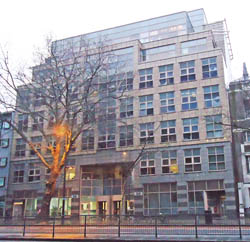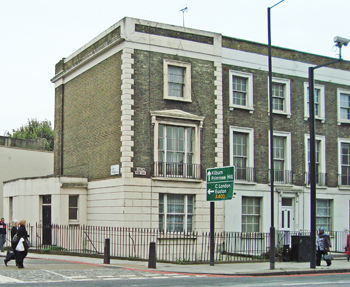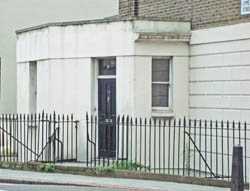Functional Nervous Disorders
(Camden Clinic)
Psychotherapeutic/
psychiatric (OPD only)
In 1890 Dr Lyttelton Stewart Forbes Winslow (1844-1913) opened a clinic to provide free treatment for poor patients suffering from mental disorders and nervous disease in a 'modest building' in Euston Square. It was called the British Hospital for Mental Disorders and the first to provide psychiatric care for mental cases. It was also known as the Forbes Winslow Memorial Hospital, after his father, Forbes Benignus Winslow (1810-1874), a physician specialising in insanity, who had recognised the need for such a hospital.
By 1891 the Hospital had moved to larger premises at 208 Euston Road.
The Hospital had no beds and Dr Winslow treated out-patients only. His patients were from the poorer classes and included children. Most were in the incipient stages of nervous trouble of a functional character, which was largely curable. Very few purely mental cases were seen, and therefore in-patient treatment was not required.
Patients were seen in the evenings, which was convenient for all parties. Dr Winslow also worked at the West End Hospital for Diseases of the Nervous System, Paralysis and Epilepsy, had a private practice and ran two small private asylums. He planned to open a convalescent home for poor patients, which would also have pedagogical facilities.
Because the Hospital had no beds, it was not eligible for financial help from most trusts and charities. By the turn of the century it had acquired a reputation for poor management with its financial and other record-keeping in disarray.
In 1900 the Hospital was listed as the British Hospital for Mental Disorders and Brain Diseases.
By 1910 the Hospital had moved to No. 72 Camden Road.
After WW1 the Hospital continued to offer free treatment for those with mental disorders, nervous diseases or nerve strain who were unable to eat, sleep or rest. It claimed that, on 1st January 1919, some 117,000 in England and Wales had been notified as insane. A further 4,000 were in hospital under observation. Some 36,000 soldiers were suffering from neurasthenia and 6,000 others were in asylums.
By the 1920s the Hospital's situation had improved and it had been renamed the British Hospital for Mental Disorders and Nervous Diseases.
In the 1930s it was renamed again and became the British Hospital for Functional Mental and Nervous Disorders.
In 1948 the Hospital joined the NHS under the control of the Paddington Group Hospital Management Committee, part of the North West Metropolitan Regional Hospital Board. It was renamed the British Hospital for Functional Nervous Disorders.
On 1st January 1961 it was renamed the Camden Clinic.
The Clinic closed in 1962 when it amalgamated with the West End Hospital for Nervous Diseases and the Paddington General Hospital. Services moved to new premises in the Harrow Road as the Paddington Clinic and Day Hospital.
Present
status (October 2008)
The building has been converted into two apartments.

The original site of the Hospital at 208 Euston Road is now part of a large modern building containing the Institute of Ismaili Studies.

The Hospital moved to a terraced house on the corner of Camden Road and Lyme Street.

The entrance to the building is in Lyme Street.
(Author unstated) 1961 Camden Clinic. British Medical Journal 2 (5269), 1793.
Dale P, Melling J (eds) 2006 Mental illness and Learning Disability since 1850: Finding a Place for Mental Disorder in the United Kingdom. Abingdon, Routledge.
http://studymore.org.uk
www.ucl.ac.uk
Return to home page